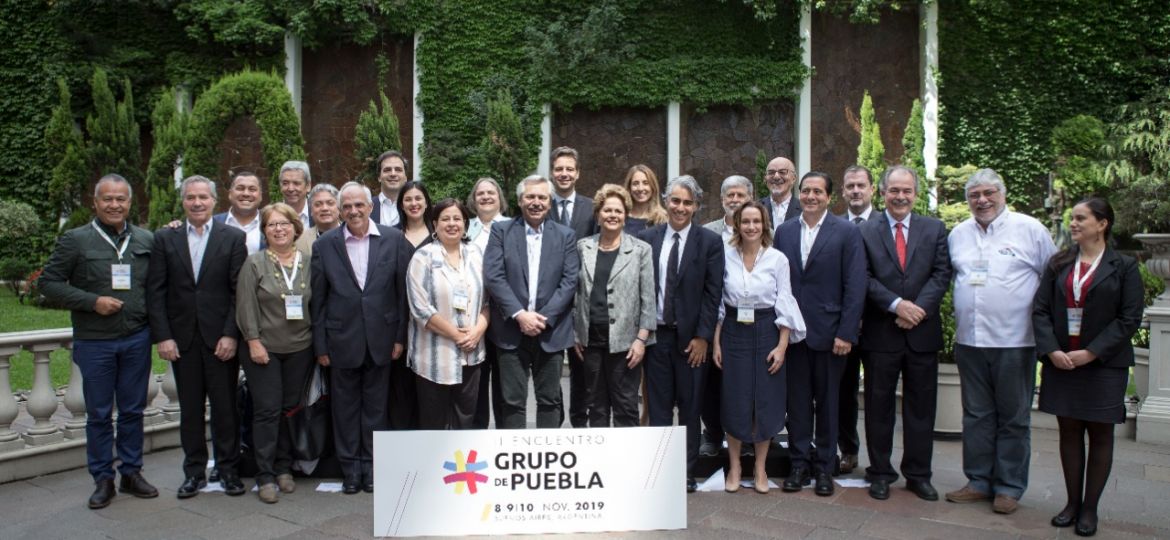
With the presence of 14 countries, the Grupo de Puebla has become one of the largest progressive groups in Latin America and Spain after one year of being founded, This space of reflection gathers leaders from different counties, who have in common a purpose of building and developing progressive and alternative proposals of government. It is a political project which is constantly building itself and growing.
This is why next Friday, July 10, the members of the Grupo de Puebla will meet to commemorate the first year of its existence, in which they will debate the “Progressive agenda to overcome the Covid-19 pandemic crisis”. The purpose of the meeting is to work in an unprecedented proposal to redesign the current rules of the market, to strengthen democracy, the State and social participation, since the Covid-19 brought to the surface the deep inequality and vulnerability of the society.
Since its creation, the Grupo de Puebla has taken on several initiatives, such as the creation of the Latin American Council for Justice and democracy (CLAJUD), which serves the purpose if fighting the use of justice as a weapon of political war and its effects on the democratic institutions on the region.
It also brought to life the Iberoaemerican Progressive Parliamentary Group (GPI), which is composed by legislators of the 14 countries and which seeks to give a legislative dimension to the proposals of the Grupo de Puebla.
The Grupo the Puebla has been able to politically link up. It was key to preserve the life of Evo Morales after the coup in his. It also posed proposals to address the moratorium of the United States of America. It also increased regional integration and it promoted legal actions through CLAJUD in Ecuador and Bolivia.
This progressive organization has also generated an active collaboration with organisms such as the G20 and the United Nations. It has also promoted seminars and talks about the different issues of the member countries.
The Grupo de Puebla was founded by over 40 progressive leaders, including 9 former presidents, two currents governments and five former presidential candidates, as well as a large number of legislators and former foreign affairs ministers.
The founders of the Grupo the Puebla are President Alberto Fernández, former presidents Dilma Rousseff, Luiz Inácio Lula da Silva, José Mujica, Rafael Correa, Ernesto Samper, Evo Morales, José Luis Rodríguez Zapatero, Fernando Lugo, Martín Torrijos y Leonel Fernández.. The group was also joined by former foreign affairs ministers Celso Amorim (Brazil), David Choquehuanca (Bolivia), Guillaume Long (Ecuador) y Hugo Martínez (El Salvador); Minister Irene Montero (España), former ministers Fernando Haddad y Aloizio Mercadante (Brazil); Carlos Ominami (Chile); Clara López Obregón (Colombia); and Daniel Martínez Villamil (Uruguay). Other members are former presidential candidates Marco Enríquez-Ominami (Chile), Cuauhtémoc Cárdenas (Mexico) y Verónika Mendoza (Peru).
Other founding members of the Grupo the Puebla are Senators Beatriz Paredes (Mexico), José Miguel Insulza and Alejandro Navarro (Chile); Mónica Xavier (Uruguay); Adriana Salvatierra (Bolivia); Iván Cepeda (Colombia); Esperanza Martínez (Paraguay); deputies Mario Delgado (Mexico); Karol Cariola (Chile); the Second Vice President of the House of Representatives of Colombia María José Pizarro; the director of the IMSS Zoe Robledo, former Senator Carlos Sotelo García and the Undersecretary for Latin America and the Caribbean Maximiliano Reyes Zúñiga (México); former President of the National Assembly, Gabriela Rivadeneira (Ecuador); lawyer Carol Proner (Brazil); and Camilo Lagos, President of the progressive party (Chile).
The anniversary meeting will take place on the following times:
11:00 a.m. El Salvador
12:00 p.m. Colombia, Ecuador, Mexico, Peru and Panama
13:00 p.m. Bolivia, Chile, Paraguay and the Dominican Republic
14:00 p.m. Argentina, Brazil and Uruguay
19:00 p.m. Spain


